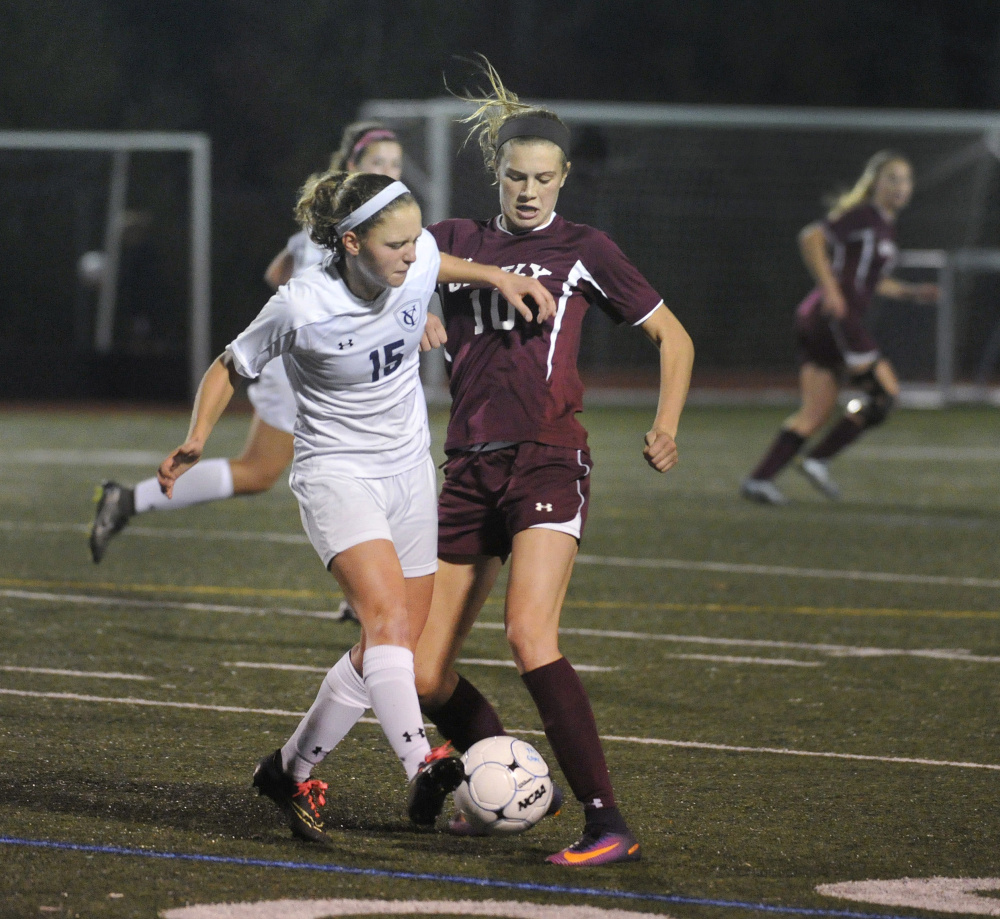Youth sports have grown exponentially in the past 50 years. Young student-athletes have more opportunities to play organized sports at a highly competitive level today than at any other time in modern history. While these opportunities have helped players at younger ages, they have also put young athletes at greater risk of sports-related injuries because of the volume of play.
As in many towns in Maine, our youth soccer program in Yarmouth, the Yarmouth Colts, is incredibly popular and has a strong link to our high school soccer programs.
As director of coaching for the Colts, as well as the head coach of our high school boys’ program, it is both my responsibility and pleasure to oversee the development of soccer players in Yarmouth from ages 3 through 18. While player safety has always been a priority, in recent years, we have moved injury prevention near the top of our list. We did this with the help of a member of our own community, physical therapist Kirsten Buchanan. With the help of her students at the University of New England, Buchanan, an assistant clinical professor of physical therapy, is helping ensure that we are taking the best and most progressive steps toward keeping our young student-athletes safe and injury free. She started by giving me the alarming statistics:
• There has been a 210 percent increase in non-contact anterior cruciate ligament tears among female soccer players in the last 10 years. About 1 in 100 female high school athletes will tear their ACLs before they graduate — and the risk rises to 1 in 10 in college.
• Ten to 20 years after the diagnosis, on average, 50 percent of those with a diagnosed ACL tear develop osteoarthritis, with the associated pain and functional impairment. Many of those young athletes go on to have total knee replacements in middle age.
The good news is that a number of statistically significant studies have shown strong evidence that ACL injury prevention programs work. An ACL injury prevention program that takes just 20 minutes, three times a week, and focuses on alignment, strength, balance and proprioception can decrease the risk of non-contact ACL tears by 80 percent.
In previous studies, researchers investigated how a 20-minute warmup program that focused on strength, alignment and controlled biomechanics would affect the risk of ACL injuries. They found that the soccer players who were in the ACL injury prevention program had 88 percent fewer ACL injuries than the control group.
Additionally, soccer’s governing body, the Fédération Internationale de Football Association, has conducted similar research supporting the same kind of decrease in ACL and lower-extremity injuries through a program called FIFA 11+. They also use a simple 20- to 30-minute warmup that emphasizes strength, balance and the quality of the motion and alignment of the lower extremities.
Based on the above research, UNE’s Buchanan piloted an ACL injury prevention program with our high school girls’ varsity soccer team and our Yarmouth Colts U13 girls’ team. The program was tremendously successful, and last year we expanded the program to include all Yarmouth high school soccer players, both boys and girls, at the varsity and sub-varsity levels.
We also added an important component to the program — weekly, hour-long yoga sessions with certified yoga instructor Lisa King.
Buchanan and UNE doctor of physical therapy students performed a preseason screening and biomechanical analysis on the athletes, and then every week the athletes received individualized attention from the UNE students as they went through a warmup program that emphasized alignment, strength and flexibility.
I am proud to say that we have not had any non-contact ACL injuries in the last three seasons.
We coaches feel strongly that the overall health and well-being of our teams, especially coming into the playoffs, were the best they have been in our 20 years here. We attribute this directly to the injury prevention program and yoga, which both resulted in improved physical performance and increased overall wellness.
The best part about this program is that any coach can implement it. UNE produced a brief video showing coaches how to take their athletes through a 20-minute warmup that will improve their alignment, strength and flexibility and decrease their risk of injury. FIFA 11+ videos as well as the ACL injury prevention protocol developed by Holly Silvers — a physical therapist involved in much of the early ACL injury research — are also available online.
The health and well-being of our student athletes are paramount. We encourage coaches across Maine and beyond to consider ACL injury prevention and yoga programs and use this invaluable resource from UNE.
Michael Hagerty Sr. is director of coaching for the youth soccer program in Yarmouth, the Yarmouth Colts, as well as head coach of the Yarmouth High School boys’ soccer program.
Send questions/comments to the editors.



Success. Please wait for the page to reload. If the page does not reload within 5 seconds, please refresh the page.
Enter your email and password to access comments.
Hi, to comment on stories you must . This profile is in addition to your subscription and website login.
Already have a commenting profile? .
Invalid username/password.
Please check your email to confirm and complete your registration.
Only subscribers are eligible to post comments. Please subscribe or login first for digital access. Here’s why.
Use the form below to reset your password. When you've submitted your account email, we will send an email with a reset code.